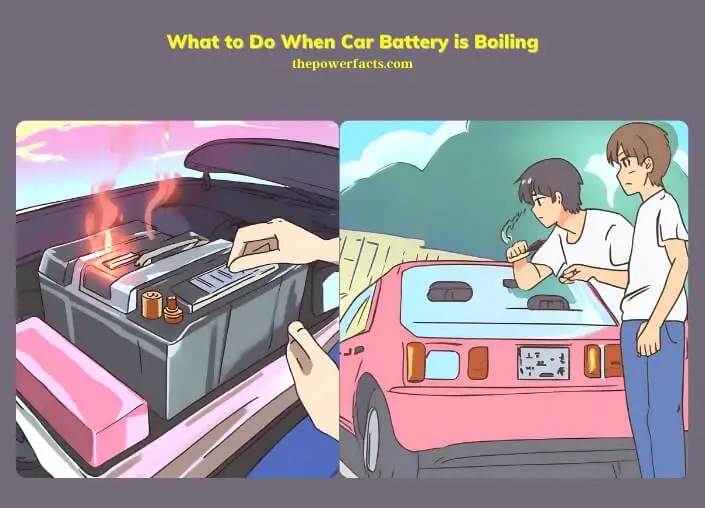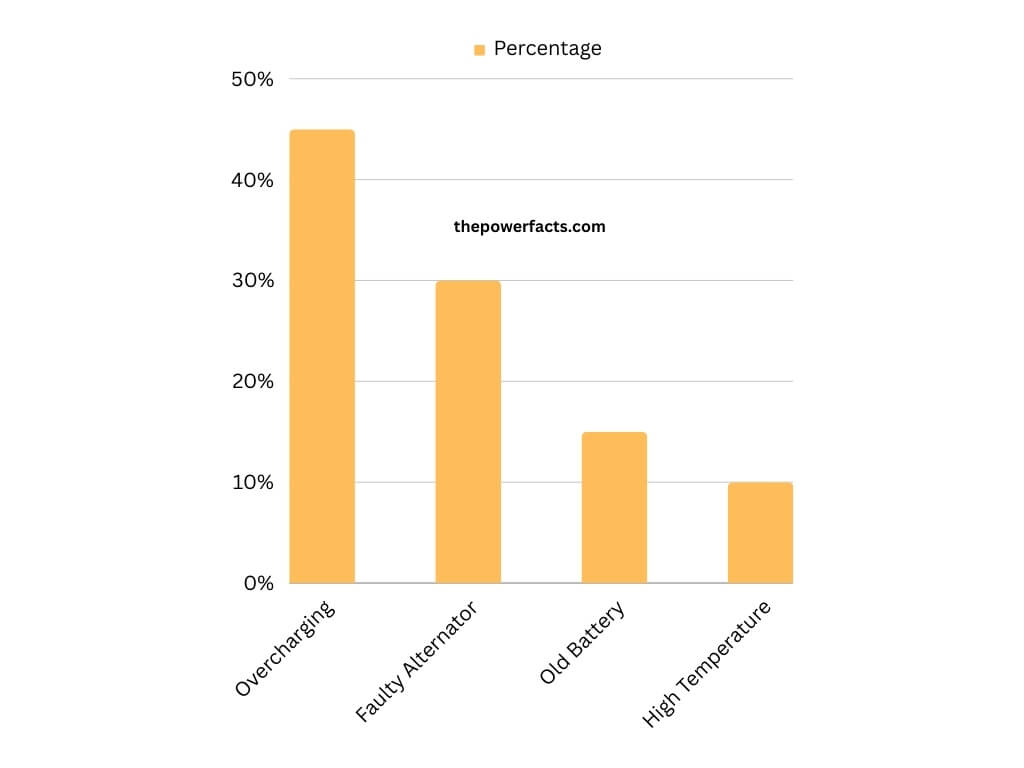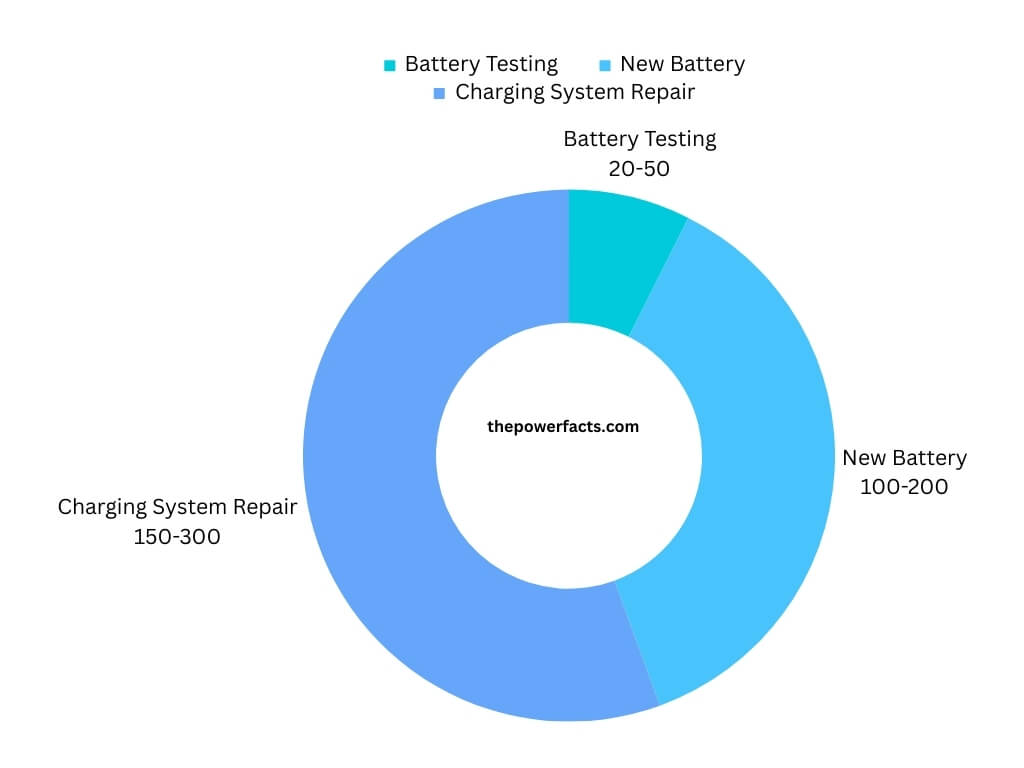If your car battery is boiling, it’s a sign of a serious issue. Immediate action is needed to prevent damage or danger.
A boiling car battery often indicates overcharging or a malfunction. This can happen while driving or when the battery is being charged. The heat generated during overcharging causes the liquid inside the battery to heat up and boil. This is not only a risk to the battery’s lifespan but also poses safety hazards.
The phenomenon of a battery boiling water inside is a reaction to the excessive current. It’s crucial to understand that this is not a normal operation. Boiling batteries to recharge them is a myth and can lead to dangerous outcomes. Similarly, if you notice your forklift battery boiling when charging, it’s a clear sign that the charging system needs immediate attention.
It’s perplexing to see your car battery boiling, and you might wonder why it’s happening. The reasons can range from a faulty regulator in the charging system to an internal short in the battery. In contrast, if the battery is not bubbling while charging, it might indicate a different issue, such as a dead cell or insufficient charging current.

For those experiencing their car battery bubbling when charging, it’s essential to stop charging immediately and seek professional help. Continuing to charge a boiling battery can lead to acid leakage or even an explosion.
For a more detailed understanding of this issue and how to address it, we invite you to read the full article below. This will provide you with in-depth information and guidance on handling a boiling car battery safely and effectively.
Safeguarding Your Vehicle: Responding to a Boiling Car Battery
Identifying a Boiling Car Battery
Signs and Symptoms
Have you ever popped the hood of your car and noticed steam or bubbling sounds coming from the battery? These are classic signs that your car battery is boiling. It’s not something to ignore. A boiling battery often swells up, and you might notice acid leakage around the terminals. It’s a clear red flag that something’s not right under the hood.
The Risks
A boiling battery is more than just a malfunction; it’s a safety hazard. The steam you see is actually dangerous gases being released. These gases can be explosive in the right conditions. Plus, the acid inside the battery is corrosive and can cause serious damage to your car and, more importantly, to you. Recognizing these risks is the first step in dealing with a boiling battery.
Immediate Steps to Take
Safety Precautions
First things first, safety is paramount. If you suspect your battery is boiling, turn off your engine immediately. Avoid smoking or any open flames near the battery, as the gases released are flammable. It’s also wise to wear protective gear, like gloves and goggles, if you need to get a closer look.
Initial Response Actions
Once you’re geared up, disconnect the battery, starting with the negative terminal. This helps prevent any electrical short circuits. Don’t try to open the battery if it’s sealed, as the built-up pressure could cause injury. Your best bet is to get your car to a professional as soon as possible.
Investigating the Causes
Overcharging Issues
One of the most common reasons for a battery boiling is overcharging. This happens when the charging system in your car sends too much power to the battery, heating up the internal liquid. It’s like turning the heat up too high when cooking; things start to overflow.
Faulty Charging System Components
Sometimes the problem lies with the components of the charging system itself, like a malfunctioning alternator or voltage regulator. These parts are supposed to keep the charging rate in check, but if they fail, your battery pays the price.
Environmental Factors and Battery Age
Don’t forget about external factors like high ambient temperatures or an old battery. Extreme heat can exacerbate the problem, and an aged battery might not be able to handle the stress of charging like it used to.
Common Causes and Statistics
| Cause of Boiling | Percentage |
| Overcharging | 45% |
| Faulty Alternator | 30% |
| Old Battery | 15% |
| High Temperature | 10% |

Prevention Tips
Regular Maintenance Checks
Keeping your car battery in top shape starts with regular maintenance checks. This means visually inspecting the battery for any signs of damage like cracks or bulges, ensuring the terminals are clean and free from corrosion, and checking the battery fluid levels if applicable. It’s also wise to have your battery’s charge and health tested periodically by a professional, especially before long trips or after it’s been unused for an extended period.
Optimal Charging Practices
The way you charge your battery significantly impacts its lifespan. Always use a charger that matches your battery’s specifications. Overcharging can be just as harmful as undercharging, so it’s essential to use a smart charger that automatically stops charging once the battery is full. For those who don’t drive often, investing in a trickle charger can keep the battery at an optimal charge level without the risks of overcharging.
Selecting the Right Battery for Your Vehicle
Choosing the correct battery for your vehicle is vital. Batteries come in different sizes, capacities, and types. Ensure the battery you select meets or exceeds the manufacturer’s specifications for your vehicle. Using a battery with insufficient capacity can lead to frequent overcharging, while an oversized battery might not charge properly, both leading to potential boiling and damage.
Seeking Professional Repair
When to Call a Professional
If you’re experiencing issues like slow engine cranking, dimming headlights, or the battery warning light on your dashboard, it’s time to call a professional. Also, if you notice any physical damage to the battery or signs of boiling, don’t attempt to fix it yourself. Professional mechanics have the right tools and expertise to diagnose and fix the problem safely.
What to Expect During Repair
During a professional repair, the mechanic will likely conduct a series of tests to diagnose the issue. These can include a load test to check the battery’s charging ability and an inspection of the charging system to ensure it’s operating correctly. Depending on the diagnosis, repairs might range from simple adjustments to replacing the battery or charging system components.
Repair and Replacement Costs
| Service | Average Cost ($) |
| Battery Testing | 20-50 |
| New Battery | 100-200 |
| Charging System Repair | 150-300 |

Long-Term Care for Your Car Battery
Best Practices for Battery Longevity
To maximize your car battery’s lifespan, keep it clean and secure in its mount to prevent vibrations. Regularly check and tighten the battery connections, as loose connections can cause sparking and battery drain. If your battery is the type that requires water, use only distilled water to refill it, and avoid overfilling.
Monitoring Battery Health
Regular monitoring of your battery’s health is key to preventing issues. This includes checking the battery voltage with a voltmeter and looking out for any warning signs in your vehicle’s performance. Many auto shops offer free battery testing, which can be a great way to keep an eye on your battery’s condition.
Battery Lifespan and Maintenance
| Battery Type | Average Lifespan (Years) | Maintenance Tips |
| Lead-Acid | 3-5 | Regular cleaning, secure mounting, check water level |
| Absorbent Glass Mat (AGM) | 5-7 | Avoid deep discharges, keep charged, minimal water maintenance |
FAQs
Can Boiling Batteries Cause Fires?
Yes, boiling batteries can indeed cause fires. The boiling is typically due to overcharging, which leads to excessive heat generation. This heat can cause the battery fluid to evaporate, leading to gas buildup inside the battery. These gases are often flammable and, if exposed to a spark or flame, can ignite. It’s essential to address a boiling battery immediately to prevent such risks. If you notice your battery boiling, ensure you handle it in a well-ventilated area and keep it away from any sources of ignition.
Is adding water to a forklift battery the same as managing a boiling car battery?
Adding water to forklift battery is not the same as managing a boiling car battery. Forklift batteries require distilled water to maintain proper electrolyte levels, while a boiling car battery indicates potential dangers such as overcharging or internal short circuits. Both situations require careful attention and proper maintenance.
Is It Safe to Drive with a Boiling Battery?
Driving with a boiling battery is not safe. The boiling indicates a severe problem, potentially leading to a breakdown or, worse, a fire or explosion. If you notice your battery boiling, it’s best to stop driving and turn off the engine as soon as it’s safe to do so. Continuing to drive could exacerbate the problem and put you and others at risk. The safest course of action is to have your vehicle towed to a professional for inspection and repair.
What Should I Do If Battery Acid Leaks?
If battery acid leaks due to boiling, it’s important to handle the situation carefully. First, ensure your safety by wearing protective gloves and goggles. Battery acid is corrosive and can cause skin burns and eye damage. Neutralize any spilled acid with a solution of baking soda and water, and then clean it up with a cloth or sponge. Do not let the acid stay in contact with your car’s metal surfaces, as it can cause corrosion. After cleaning, dispose of the contaminated materials safely and consider getting a professional to check your car.
Can a Boiling Battery Damage Other Car Components?
A boiling battery can indeed damage other components of your car. The excessive heat generated by a boiling battery can affect nearby wiring and plastic components, potentially leading to melting or weakening. The acid from a leaking or boiling battery can also corrode nearby metal surfaces and damage electronic components. It’s crucial to address a boiling battery immediately to prevent such collateral damage to your vehicle.
Should I Add Water to a Boiling Battery?
Adding water to a boiling battery should be done with caution. If the battery is a type that allows for water to be added (not a sealed type), and the water level is low, you can add distilled water.
Do this only when the battery is cool. Never add water to a hot or boiling battery, as it can react violently and cause splashing of the acid, leading to injury. Always wear protective gear when handling batteries and consider seeking professional help if unsure.
Can Cold Weather Cause a Battery to Boil?
Cold weather itself does not cause a battery to boil. However, it can contribute to the problem. In cold conditions, the battery has to work harder to start the engine, which can strain an already weak or damaged battery.
Charging systems may overcompensate in cold weather, potentially leading to overcharging the battery. Regular maintenance and checks, especially in cold weather, can help prevent issues related to battery boiling.
How Long Does It Take to Fix a Boiling Battery?
The time it takes to fix a boiling battery depends on the underlying cause. If the issue is simple, like adjusting the charging system or adding distilled water to the battery, it can be resolved quickly, often within an hour.
If the problem is more complex, such as replacing damaged components or the entire battery, it could take several hours or more. The exact time frame can be determined by a professional mechanic after diagnosing the specific cause of the boiling.
In summary, a boiling car battery is a sign that something’s wrong, and it needs your attention. From safety precautions and immediate steps to long-term care and maintenance, taking the right actions can prevent serious damage to your car and keep you safe. Remember, regular check-ups and being aware of your battery’s condition are key to a healthy car battery life.